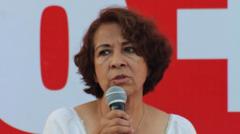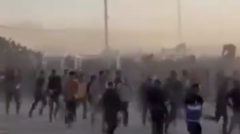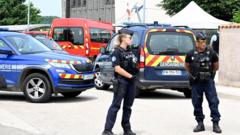Daniel Noboa has won re-election in Ecuador amid significant political turmoil, with allegations of fraud from his opponent, Luisa González. Noboa's administration is marked by a tough stance on crime, yet challenges remain regarding security and economic stability.
Ecuador Elects Daniel Noboa for a Full Term Amid Controversy

Ecuador Elects Daniel Noboa for a Full Term Amid Controversy
President Daniel Noboa secures a decisive re-election victory, but challenges loom as his opponent claims electoral fraud.
Sitting president Daniel Noboa has successfully secured a full four-year term in Ecuador's presidential election run-off, positioning himself for continued leadership against the backdrop of a nation grappling with soaring violence linked to drug gangs. Noboa, who recently took office in November 2023 after a snap election, characterized his re-election as a "historic" moment, achieving approximately 56% of the votes, according to the national electoral council.
His opponent, left-wing candidate Luisa González, however, rejected the election outcome, alleging fraud without offering substantive evidence. In her address to supporters in Quito, González's claims suggest deep-seated divisions in the electorate. Noboa declared that the clear win—over a million votes ahead—demonstrates a strong mandate from the people, highlighting the dedication of his supporters.
Noboa's administration has emphasized a vigorous military-backed campaign against the pervasive criminal gangs besieging the nation, prompting significant militarization in streets and prisons. His ambitions extend beyond domestic measures; he is exploring partnerships with foreign military forces, including potential American assistance in the fight against gang violence. Moreover, he aims to amend constitutional restrictions to allow foreign military bases once again in Ecuador.
Despite a slight decrease in homicide rates during Noboa's tenure, violence levels are still among the highest in the region. In January alone, Ecuador recorded over 780 homicides, making it one of the most violent months in history. Public safety was a dominant concern for voters leading into the election—now, Noboa faces the pressure to demonstrate positive results in tackling crime and boosting employment.
Last year, Noboa's approval ratings dipped, exacerbated by severe droughts that caused extensive power outages across the nation. He has proposed significant investments in renewable energy sources to lessen dependence on hydropower. His relationship with the United States has also garnered attention; he recently announced tariff increases on Mexican goods and retracted an amnesty for undocumented Venezuelans in Ecuador.
Noboa's campaign managed to engage younger voters effectively, featuring a robust job creation agenda and dynamic social media outreach. Nevertheless, González's supporters are expressing a sense of nostalgia for the era of former president Rafael Correa—an era that benefitted from oil revenue and economic stability, yet is tainted by allegations of authoritarian governance and corruption. As Noboa's government strives to navigate a deeply polarized political landscape, questions loom about addressing the needs of all Ecuadorians to foster unity and peace.




















